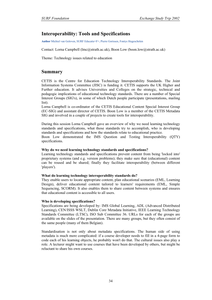The Learning Technology Research Institute (LTRI) and the Association for Learning Technology (ALT) are two organisations within the UK that focus on ICT in the field of learning and teaching. Chapter of report on the Exchange Study Trip 2002, organised by SURF from the 21st till the 26th of April 2002.
DOCUMENT

The Learning Technology Research Institute (LTRI) and the Association for Learning Technology (ALT) are two organisations within the UK that focus on ICT in the field of learning and teaching. Chapter of report on the Exchange Study Trip 2002, organised by SURF from the 21st till the 26th of April 2002.
DOCUMENT

The Learning Technology Research Institute (LTRI) and the Association for Learning Technology (ALT) are two organisations within the UK that focus on ICT in the field of learning and teaching. Chapter of report on the Exchange Study Trip 2002, organised by SURF from the 21st till the 26th of April 2002.
DOCUMENT

Background:Many business intelligence surveys demonstrate that Digital Realities (Virtual reality and Augmented Reality) are becoming a huge market trend in many sectors, and North America is taking the lead in this emerging domain. Tourism is no exception and the sector in Europe must innovate to get ahead of the curve of this technological revolution, but this innovation needs public support.Project partnership:In order to provide labs, startups and SMEs willing to take this unique opportunity with the most appropriate support policies, 9 partner organizations from 8 countries (FR, IT, HU, UK, NO, ES, PL, NL) decided to work together: regional and local authorities, development agencies, private non-profit association and universities.Objective of the project:Thanks to their complementary experiences and know-how, they intend to improve policies of the partner regions (structural funds and regional policies), in order to foster a tourist channeled innovation in the Digital Realities sector.Approach:All partners will work together on policy analysis tasks before exchanging their best initiatives and transferring them from one country to another. This strong cooperation will allow them to build the best conditions to foster innovation thanks to more effective structural funds policies and regional policies.Main activities & outputs:8 policy instruments are addressed, among which 7 relate to structural funds programmes. Basis for exchange of experience: Reciprocal improvement analysis and 8 study trips with peer-review of each partner’s practices. Video reportages for an effective dissemination towards other territories in Europe.Main expected results:At least 16 good practices identified. 8 targeted policy instruments improved. At least 27 staff members will transfer new capacities in their intervention fields. At least 8 involved stakeholders with increased skills and knowledge from exchange of experience. Expected 17 appearances in press and media, including at European level.